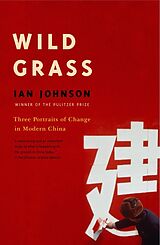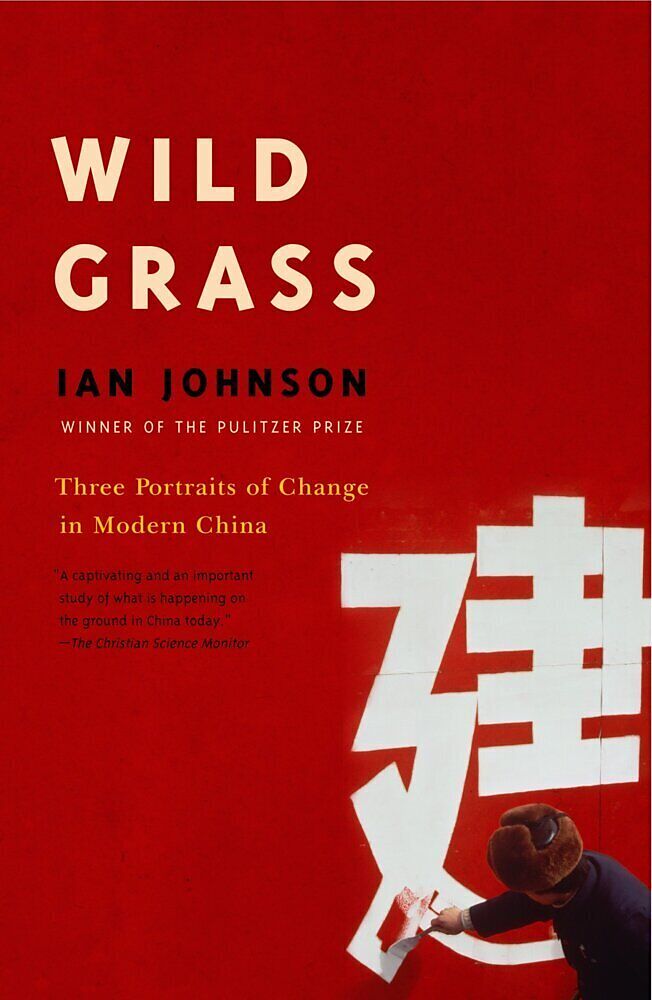Wild Grass
Einband:
Kartonierter Einband
EAN:
9780375719196
Untertitel:
Three Stories of Change in Modern China
Genre:
Politikwissenschaft
Autor:
Ian Johnson
Herausgeber:
Random House N.Y.
Anzahl Seiten:
336
Erscheinungsdatum:
08.03.2005
ISBN:
978-0-375-71919-6
Zusatztext A captivating and an important study of what is happening on the ground in China today. The Christian Science Monitor Compelling. . . . Beautifully spare. . . . Johnson is to be commended for his sensitive rendering of his subjects. The New York Times Illuminating. . . . There is no better [book] on what life is like for ordinary uppity Chinese. . . . Johnson has not only lifted a corner of the curtain which covers China's reality beyond its glittering eastern cities; he has drawn the whole curtain. The Times Literary Supplement Memorable. . . . Perhaps more than any other recent writer! Ian Johnson . . . captures [China's] 'slow-motion revolution.' The Baltimore Sun Elegant. . . . Through dogged reporting . . . we get an exciting inside view. . . . Wild Grass is journalism at its best. South China Morning Post A triumph. . . . Compelling. . . . A hopeful book. . . . The author's reporting skills are phenomenal. . . . An invaluable aid for anyone . . . hoping to understand [China's] economic and political struggles. The Washington Times A gripping tale of a very few ordinary people and their extraordinary courage in fighting for their rights against the Communist Party leviathan. The Washington Post Book World This year's best general book on China. China Economic Quarterly Elegantly written. . . . Poignant. . . . Insightful! well-crafted. . . . Likely to find a broad readership. Boston Review Cause for hope for China's future. . . . In vivid detail! [Johnson] recounts . . . cases . . . that show that individual Chinese at last have hope that the legal system can help. Foreign Affairs Gripping . . . taut! perceptive writing. . . . Reads in parts like a John Grisham legal thriller. Houston Chronicle Johnson is a wonderful storyteller. . . . His book is filled with evocative passages. . . . He captures the resilient spirit of many Chinese people. The Christian Science Monitor Johnson writes well! wielding a remarkably gentle pen against the grossest injustices or when describing the most remarkable instances of personal bravery. The people written about here could wish for no better chronicler. The Asian Review of Books This year's best general book on China. China Economic Quarterly Informationen zum Autor Ian Johnson is the Berlin Bureau chief for The Wall Street Journal . In 2001, when he was the Journal 's Beijing correspondent, he won the Pulitzer Prize for his reporting on the Falun Gong. He lives in Berlin. Klappentext From a Pulitzer Prize-winning journalist comes a unique portrait of a new revolution currently under way in China: the demand for civil liberties by ordinary citizens. The Peasant Champion The photo of Ma Wenlin fluttered in my hand, catching the attention of the man sitting across from me on the train. He's a lawyer, I said. I'm looking for him. The man was silent for a moment and then said, He looks like a peasant, not a lawyer. The black-and-white picture showed Mr. Ma staring straight into the camera, his face expressionless except for his faint eyebrows, which arched slightly in a quizzical expression. His hair was short, almost crew-cut, and he had a light stubble above his lips. He wore a plain white dress shirt, buttoned to the neck but with no tie. There was no effort to engage the viewer, no grin, no smile. It was an old-fashioned photo of a man who didn't pose for the camera as modern people do, a man who in the first half of his fifty-nine-year life had been photographed just once or twice. He represented peasants, I said. In a lawsuit against the government. Like all second-class sleepers, ours had six bunks and no door, allowing ...
Autorentext
Ian Johnson is the Berlin Bureau chief for The Wall Street Journal. In 2001, when he was the Journal’s Beijing correspondent, he won the Pulitzer Prize for his reporting on the Falun Gong. He lives in Berlin.
Klappentext
From a Pulitzer Prize-winning journalist comes a unique portrait of a new revolution currently under way in China: the demand for civil liberties by ordinary citizens.
Zusammenfassung
In Wild Grass, Pulitzer Prize—winning journalist Ian Johnson tells the stories of three ordinary Chinese citizens moved to extraordinary acts of courage: a peasant legal clerk who filed a class-action suit on behalf of overtaxed farmers, a young architect who defended the rights of dispossessed homeowners, and a bereaved woman who tried to find out why her elderly mother had been beaten to death in police custody. Representing the first cracks in the otherwise seamless façade of Communist Party control, these small acts of resistance demonstrate the unconquerable power of the human conscience and prophesy an increasingly open political future for China.
Leseprobe
The Peasant Champion
The photo of Ma Wenlin fluttered in my hand, catching the attention of the man sitting across from me on the train.
“He’s a lawyer,” I said. “I’m looking for him.”
The man was silent for a moment and then said, “He looks like a peasant, not a lawyer.”
The black-and-white picture showed Mr. Ma staring straight into the camera, his face expressionless except for his faint eyebrows, which arched slightly in a quizzical expression. His hair was short, almost crew-cut, and he had a light stubble above his lips. He wore a plain white dress shirt, buttoned to the neck but with no tie. There was no effort to engage the viewer, no grin, no smile. It was an old-fashioned photo of a man who didn’t pose for the camera as modern people do, a man who in the first half of his fifty-nine-year life had been photographed just once or twice.
“He represented peasants,” I said. “In a lawsuit against the government.”
Like all second-class sleepers, ours had six bunks and no door, allowing people to wander freely down the car, poking their heads in to visit friends and see who else was on board. But we were alone: the only other person in our compartment, a man in a middle bunk, was snoring lightly and the other passengers bustled back and forth in the corridor, concerned only with finding thermoses of hot water to make tea.
“Those kinds of lawsuits are complicated,” the man said ambiguously.
Then he paused and collected his thoughts. He had a shock of gray hair that hadn’t receded an inch from his tanned, creased forehead. His suit was Chinese style, the sort worn by the founder of modern China, Sun Yat-sen, and popularized by Mao Zedong, or Chairman Mao, communist China’s first leader. Like Mr. Ma, the man wore his shirt buttoned up to the neck, with a fountain pen sticking out of the left breast pocket. It was the outdated uniform of Communist Party cadres from a decade ago, one rarely seen in the country’s prosperous areas. But here, in a slow train leaving a remote county seat, it didn’t look quite so out of place.
“I’m sure he won’t be successful,” he continued, looking at me carefully. “This is a poor part of the country.”
I nodded but disagreed, casting a glance outside for confirmation. The windows of the train were streaked with rain, and through the blurred glass the denuded hills and earth-colored villages of the Loess Plateau rolled by. Once, this had been fertile forests and steppes, one of the birthplaces of Chinese civilization. Nearby was the grave of the Yellow Emperor, mythic founder of the Chinese people. Down in Xi’an, where we were headed, were the world-famous terra-cotta warriors that had been buried with China’s first emperor more than two thousand years ago. He and other rulers had protected this cultural heartland by building fortifications not far from here that later became known as the Great Wall. Seventy years ago th…

Leider konnten wir für diesen Artikel keine Preise ermitteln ...
billigbuch.ch sucht jetzt für Sie die besten Angebote ...
Die aktuellen Verkaufspreise von 6 Onlineshops werden in Realtime abgefragt.
Sie können das gewünschte Produkt anschliessend direkt beim Anbieter Ihrer Wahl bestellen.
Loading...
Die aktuellen Verkaufspreise von 6 Onlineshops werden in Realtime abgefragt.
Sie können das gewünschte Produkt anschliessend direkt beim Anbieter Ihrer Wahl bestellen.
| # | Onlineshop | Preis CHF | Versand CHF | Total CHF | ||
|---|---|---|---|---|---|---|
| 1 | Seller | 0.00 | 0.00 | 0.00 |
